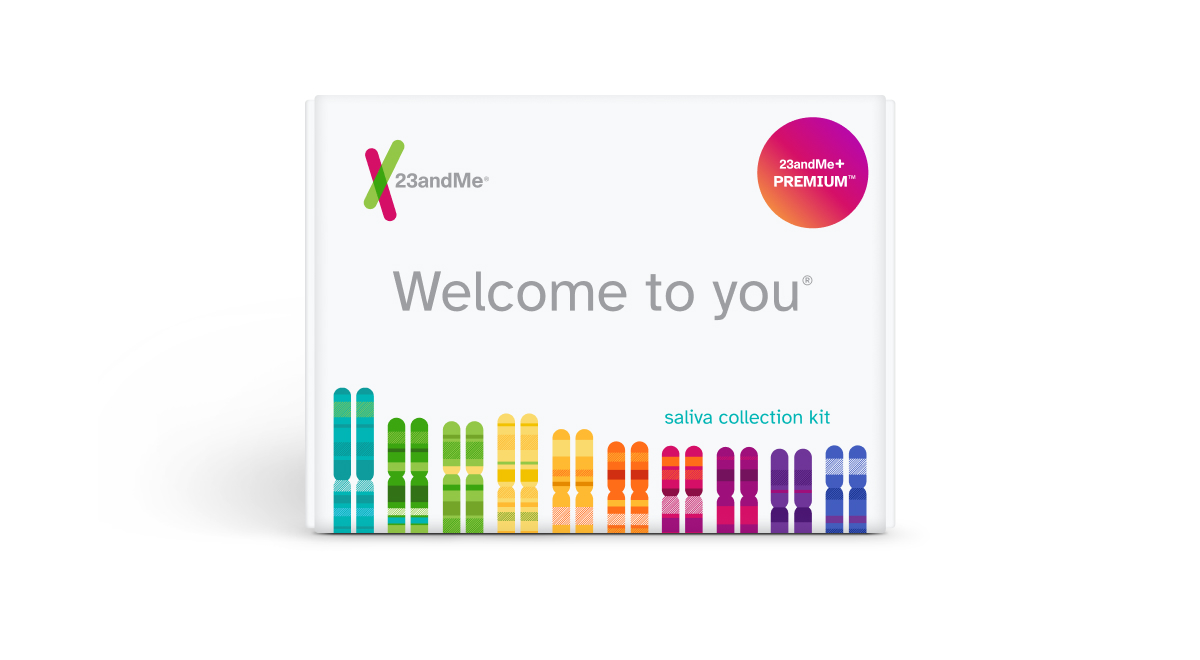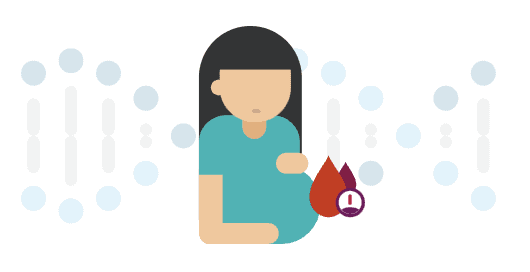Explore Preeclampsia and what your DNA can tell you
What is preeclampsia?
Preeclampsia is a pregnancy complication that causes persistent high blood pressure and in some cases, injury to organs like the liver and kidneys. The onset and severity of preeclampsia can vary greatly, but it typically develops later in pregnancy and resolves after delivery. Preeclampsia is usually diagnosed based on a combination of high blood pressure (>140 mmHg systolic and/or >90 mmHg diastolic), abnormal lab tests, and/or other symptoms. The condition requires careful monitoring throughout pregnancy, delivery, and the post-partum period to minimize health impacts for both the parent and child. The causes of preeclampsia are not fully understood, but scientists think that it stems from issues with the development and function of the placenta early in pregnancy.

What are the health impacts of preeclampsia?
The symptoms of mild preeclampsia may not be noticeable, or they may mimic typical experiences in pregnancy, like swelling of the hands or face. When preeclampsia does cause symptoms, they can include things like headaches, changes in vision, upper right abdominal pain, agitation or confusion, and shortness of breath. These symptoms may be a sign of more advanced preeclampsia (called eclampsia) or a condition called HELLP, which is named for its characteristics of red blood cell damage (Hemolysis), Elevated Liver enzymes, and Low Platelet count. Eclampsia and HELLP can be dangerous for the parent and baby, so it’s important to follow healthcare provider recommendations for testing and to seek immediate medical attention for any signs of preeclampsia.
In addition, preeclampsia can restrict the growth of the baby during pregnancy and increase risk for future conditions for the parent like high blood pressure, heart disease, kidney disease, and developing preeclampsia in future pregnancies. For these reasons, preeclampsia may require careful monitoring, medication, and consideration of early delivery in order to minimize complications for both parent and child.

Is preeclampsia genetic?
Genetics do play a role in preeclampsia. This means some people may be more likely to develop preeclampsia than others, depending on their genetics. A person has an increased chance of developing preeclampsia if one family member has had it, and an even higher chance if multiple family members have had preeclampsia. In most cases, it is a combination of many different genetic variants that impact a person’s chances of developing preeclampsia. Individually, each of these variants only has a small impact on a person’s genetic likelihood, but that impact can grow when many variants are considered together. 23andMe takes into account 14,462 genetic markers to estimate the likelihood of developing preeclampsia, but keep in mind that other factors besides genetics can also influence a person’s overall likelihood of developing preeclampsia.
Other factors that may cause an increased likelihood of preeclampsia
It is estimated that preeclampsia develops in about 4% of pregnancies in the United States. Besides genetics, some factors that can increase a person’s chances of developing preeclampsia include:
- Personal history of preeclampsia (preeclampsia is more likely to recur in future pregnancies)
- Certain health conditions (including high blood pressure, diabetes before pregnancy, migraine, kidney disease, or some autoimmune conditions)
- Certain types of pregnancies (including being pregnant with multiple babies, first pregnancies, or pregnancies using in vitro fertilization)
- Age (preeclampsia is more likely to occur in individuals over 35)
- Being of African/African American descent
- Family history of preeclampsia

Find out if your genetics might increase your likelihood of developing preeclampsia
Curious whether you have an increased likelihood of developing preeclampsia based on your genetics? Find out more with the Preeclampsia report (Powered by 23andMe Research), part of the 23andMe+ Premium membership. 23andMe+ Premium includes our Health + Ancestry Service plus new premium reports and features throughout the year.

23andMe+ Premium
Please note:
- Because preeclampsia is a pregnancy-related condition, this report is only available to 23andMe+ members who report their birth sex as female in their Account Settings.
- This report does not diagnose preeclampsia and should not be used to make medical decisions.
- The report was developed by 23andMe scientists using data and insights gathered from thousands of customers who consent to participate in our research. Reports based on 23andMe research provide an estimate of your likelihood of developing a condition based on your genetics and other factors. This report does not account for lifestyle or family history.
- The report does not account for every possible genetic variant that could affect your likelihood of developing preeclampsia.
References:
- American Pregnancy Association. “Preeclampsia.” Retrieved October 12, 2022, from https://americanpregnancy.org/healthy-pregnancy/pregnancy-complications/preeclampsia/.
- Bartsch E et al. (2016). “Clinical risk factors for pre-eclampsia determined in early pregnancy: systematic review and meta-analysis of large cohort studies.” BMJ. 353:i1753.
- Mayo Clinic. “Preeclampsia.” Retrieved October 12, 2022, from https://www.mayoclinic.org/diseases-conditions/preeclampsia/symptoms-causes/syc-20355745.
- MedlinePlus. “Preeclampsia.” Retrieved October 12, 2022, from https://medlineplus.gov/genetics/condition/preeclampsia/.
- National Institute of Child Health and Human Development. “Preeclampsia and Eclampsia.” Retrieved October 12, 2022, from https://www.nichd.nih.gov/health/topics/preeclampsia.
- Phipps EA et al. (2019). “Pre-eclampsia: pathogenesis, novel diagnostics and therapies.” Nat Rev Nephrol. 15(5):275-289.
- Preeclampsia Foundation. “What is Preeclampsia.” Retrieved October 12, 2022, from https://www.preeclampsia.org/what-is-preeclampsia.
- Rana S et al. (2019). “Preeclampsia: Pathophysiology, Challenges, and Perspectives” Circ Res. 124(7):1094-1112.
- Serrano NC et al. (2020). “Family history of pre-eclampsia and cardiovascular disease as risk factors for pre-eclampsia: the GenPE case-control study.” Hypertens Pregnancy. 39(1):56-63.
- US Preventive Services Task Force. et al. (2017). “Screening for Preeclampsia: US Preventive Services Task Force Recommendation Statement.” JAMA. 317(16):1661-1667.
